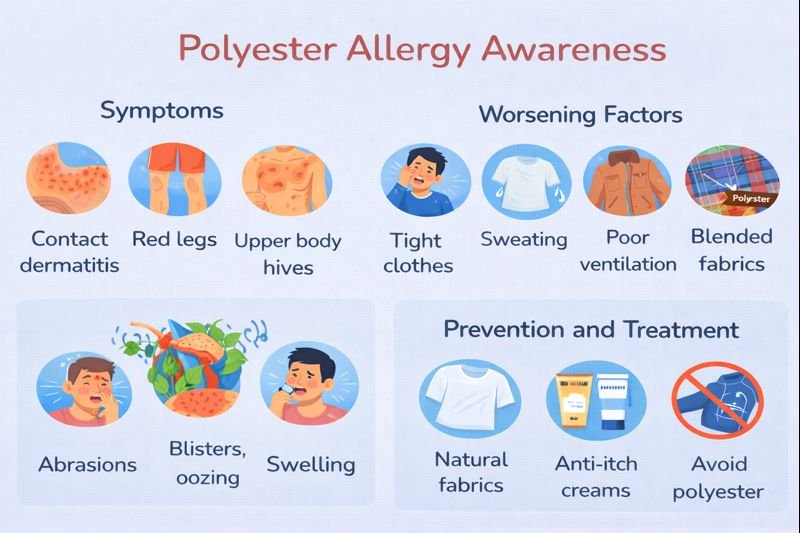Polyester Allergy and Fabric Reactions: Symptoms, Prevention, and First Aid Awareness in Canada
Understanding Fabric-Related Allergic Reactions
Most allergic reactions occur after eating certain foods or coming into contact with chemicals. However, some reactions are triggered by clothing and fabrics that stay in close contact with the skin for long periods. Polyester, a common synthetic fabric, is frequently linked to skin irritation and allergy-like reactions, especially in people with sensitive skin.
Fabric reactions can appear quickly or develop gradually over time, depending on the individual and the conditions in which the fabric is worn.
Why This Matters for First Aid and Workplaces in Canada
Polyester is widely used in work uniforms, athletic wear, personal protective equipment, bedding, and upholstery across Canadian workplaces and public settings. Skin reactions caused by clothing can affect comfort, concentration, and safety—particularly in warm, physically demanding, or high-friction environments. First aid awareness helps identify fabric-related reactions early and reduce ongoing exposure.
A Realistic Scenario
A warehouse worker begins wearing a new polyester uniform. After several hours, they notice intense itching and red patches on their legs and torso. A supervisor trained in first aid recognizes this as a possible fabric reaction and supports the worker in changing clothing, cleaning the skin, and monitoring symptoms to prevent worsening irritation.
Symptoms of Polyester Allergy or Sensitivity

Common skin-related symptoms include:
-
Contact dermatitis
-
Red or irritated patches, especially on the legs or torso
-
Rashes in areas touching polyester
-
Hives, often on the upper body
-
Skin abrasions or chafing
-
Bright redness on the hands
-
Mild to severe itchiness
-
Tenderness or a warm sensation on the skin
In some cases, symptoms may extend beyond the skin.
Less Common but More Concerning Symptoms
When reactions worsen or complications occur, some individuals may experience:
-
Shortness of breath
-
Chest tightness or discomfort
-
Swelling
Breathing symptoms or widespread swelling require urgent medical attention.
Factors That Can Worsen Polyester Reactions
Certain conditions increase the likelihood or severity of fabric-related reactions:
-
Tight-fitting clothing
-
Excessive moisture or sweating
-
Poor ventilation of the skin
-
Overheating
-
Friction or skin trauma
-
Pre-existing skin conditions
-
Clothing blends that include polyester
-
Fabric dyes leaching during heavy sweating
-
Detergents, fragrances, or fabric softeners
-
Animal fur or sweat trapped in fabric fibers
These factors are common in active workplaces and warm environments.
First Aid Awareness for Polyester Skin Reactions
From a first aid perspective, the focus is on removing exposure and soothing the skin:
-
Stop wearing the suspected fabric as soon as possible
-
Cleanse the skin gently using mild soap and warm water
-
Avoid harsh or fragranced products
-
Apply cool or damp compresses to reduce redness and discomfort
-
Keep hands clean before touching irritated skin
-
Monitor symptoms, especially spreading rash or breathing changes
If symptoms interfere with work duties or worsen, follow workplace health procedures and seek medical assessment.
Prevention and Workplace Considerations
There is no cure for polyester allergy or sensitivity, but avoiding exposure is the most effective prevention.
Common items that may contain polyester include:
-
Work and athletic clothing
-
Pajamas and sleepwear
-
Shirts, blouses, and pants
-
Carpets and upholstery
-
Bedsheets and blankets
-
Toys and soft furnishings
Many people with fabric sensitivity tolerate natural fibres better, such as cotton, linen, silk, denim, wool, or other breathable materials.
Workplaces can support prevention by:
-
Allowing alternative clothing materials where possible
-
Ensuring breathable uniforms or PPE
-
Reducing heat and moisture buildup
-
Encouraging reporting of skin irritation early
Frequently Asked Questions (FAQ)
Is polyester allergy common?
Fabric-related skin reactions are fairly common, especially among people with sensitive skin.
Can polyester reactions appear suddenly?
Yes. Symptoms may occur immediately or after repeated exposure over time.
Are polyester blends safer than pure polyester?
Not always. Blended fabrics can still cause reactions, especially when combined with dyes or tight fit.
Can detergents cause similar symptoms?
Yes. Detergents, fragrances, and fabric softeners often contribute to or worsen fabric reactions.
Why is first aid awareness important for fabric reactions?
Early recognition and removal of exposure can prevent worsening skin damage and complications.
Educational Note
This article is intended for general first aid and workplace safety education in Canada. It promotes awareness of fabric-related skin reactions but does not replace medical evaluation or emergency care when needed.
